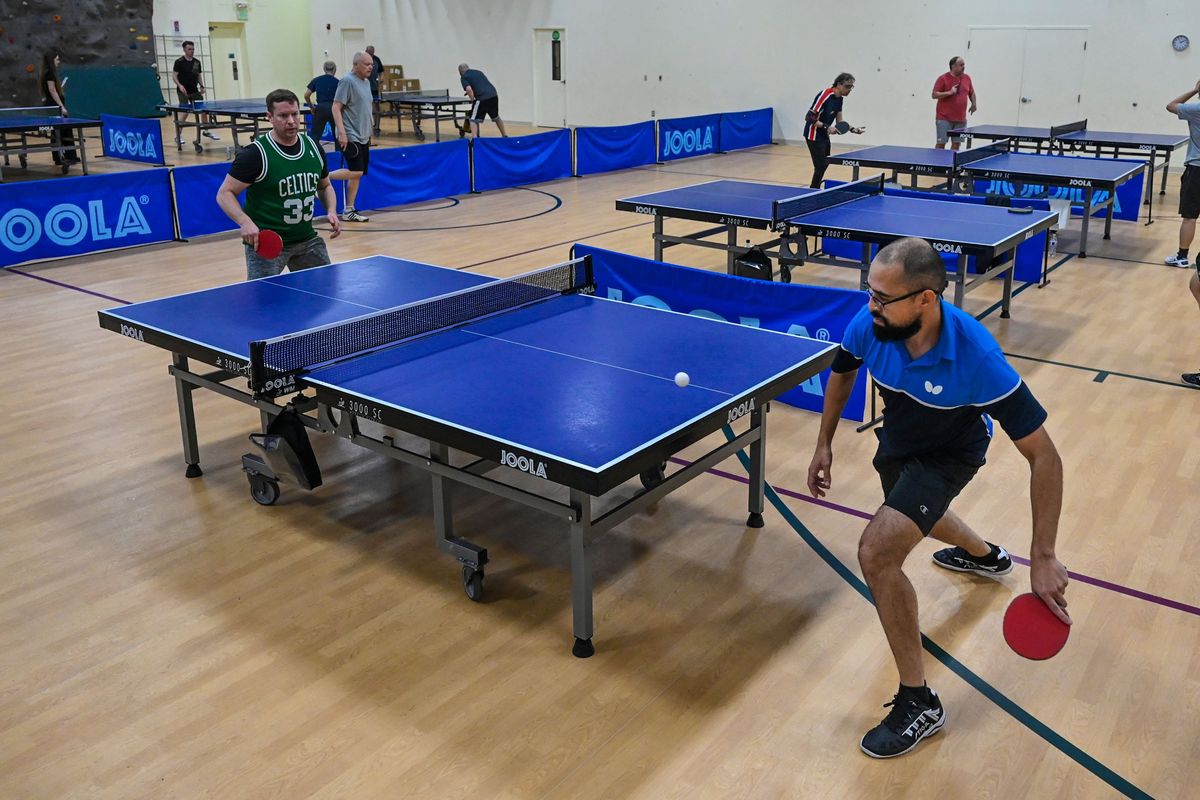Ping-pong players from all skill levels, ages and countries of origin flock to play ‘chess at light speed’ in weekly club gathering

Like a nest housing an egg, Ravi Waran’s cupped hand cradled a white ping-pong ball. After a couple of deliberate bounces on the corner of the table in front of him, his face inches from the ball, he tossed it into the air. Eyes locked, his paddle made contact and shot it toward opponent Nick Dotson.
“People call it chess at light speed,” Dotson said as Waran readied another serve. “In chess, it’s almost like infinite options and things that can happen. It’s similar in table tennis.”
Every Sunday, the walls of the gym in the Girl Scouts building echo with the resonant clucking sounds of eight simultaneous games of ping-pong as the West Central Table Tennis club meets for three hours of round -robin play.
Dotson, club director, founded the club in 2015. Initially, it was him and some friends. They made T-shirts, gathered for beer, barbecue and casual table tennis until some more advanced 60- to 70-year-old players found his posting on Craigslist.
“I was in pretty good shape, and fairly athletic. And I thought I was pretty good,” Dotson said as he laced up his sneakers designed in China specifically for table tennis. “And some real table tennis players sniffed out the little group that I’d put together and asked if they could join us in play.”
“I remember playing this guy, and he absolutely crushed me, just wiped the floor with me. And that was just like, it was kind of the competitive spirit in me that said, ‘I want to do that.’ ”
Dotson’s obsession began after suffering the defeat, eventually competing in the U.S. Open and the U.S. National Table Tennis Championships, where he blew out his Achilles tendon.
Dotson’s club filled a need in the city. Others were also in the market for an organized gathering for their hobby, and now the club sees 25 to 30 attendees each week. They range from novice to advanced, and a range of ages and diverse countries of origin, all jazzed about the sport.
“That’s another thing that’s great about this game is there’s so many equalizers,” Dotson said. “We’ll have weeks where there’s, like, a 9-year-old girl playing a 80-year-old man, and they’re having a fun time and a competitive game with each other.”
Players keep track of their scores against each other, and Dotson arranges them by skill on a ladder to keep the competition even and fierce. Advanced players often take on amateurs, Dotson said, but players don’t mind.
“Even an advanced player can have fun playing a beginner,” Dotson said.
“It is kind of the best place to come to grow,” Zach Smith said, recalling his first time at the club in 2022 and starting on the bottom rung of the ladder.
He’s seen his skills improve, even investing in higher quality gear like a new ping-pong paddle with more “pop” to it, he said.
“It feels like a sport doing it here,” Smith said. “Doing it at Grandma’s house with your cousins is fun, but this is intense.”
Alejandro Arango played ping-pong as a kid in his hometown of Bogota, Colombia. His friend, club regular Luis Ponton, invited him for something different to spice up his weekend routine.
“I played before and it sounded like fun for a Sunday afternoon, doing something different,” Arango said.
Outside of childhood play and the occasional casual match, Arango isn’t a frequent player.
The same cannot be said for regular attendee Tony Shibutani.
Shibutani has been coming to the club for years and has seen the improvements in his skills both at the table and in his daily life.
“Ping-pong is amazing; it looks so simple, but you can sweat so easy,” Shibutani said, fanning himself with his paddle. “I think it’s very good eye-hand coordination, and mentally, it makes you sharper. For awareness, even when you’re driving. If you have this skill, your driving might get better too.”
The hypnotic passage of the ball is relaxing for Shibutani, who first played in junior high in Japan, and the footwork makes for an effective workout, he said.
Jeff Webster’s is a vociferous game. The repetitive click of ping-pong balls is punctuated with Webster’s exaggerated cries and groans at the end of contentious points.
The retiree joined the club just over a month ago.
“I had nothing to do,” he said. “I was one of those guys who played at work and thought I was good and came here and – not.”
Initially looking for a way to pass the time, Webster found that the low-impact sport helped him recover from stiffness and pain from a hip replacement surgery, helping his balance “tremendously.”
Ping-pong was a popular sport in Richard Biernat’s childhood in Poland. It’s cheaper and easier to learn compared to sports like tennis, leading to its proliferation in Polish schools.
Biernat’s been to about three club meetings and plans to go to more, he said. The sport is familiar to him, giving him a sense of ease where other things bring confusion.
“I came over in ’83, so it was kind of weird you guys have cats on leashes. I should have suspected something weird, we don’t have that,” he said through laughter. “Cats are free cats.”
West Central Table Tennis meets at the Girl Scout’s gym on 1404 N. Ash St. from 1 to 4 p.m. every Sunday. They don’t meet in the summers, Dotson said, between Memorial Day and Labor Day. Entry is $8, and spaces can be reserved on the club’s website.